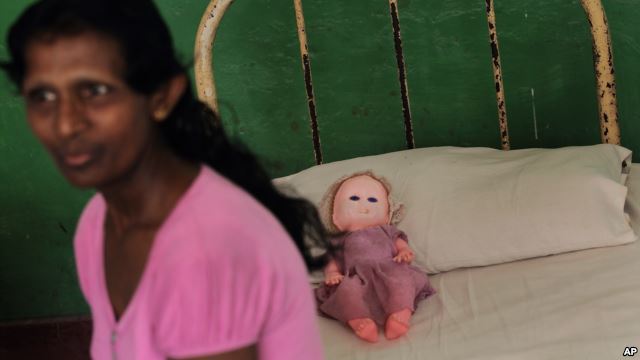VOA慢速英语:数百万有心理健康疾病的人们得到很少或没有得到治疗
The World Health Organization reports that hundreds of millions of people have a mental health disorder, but receive little or no treatment.
A new WHO report finds that very little of the money spent on health care goes to treating those with mental conditions.
The WHO's Mental Health Atlas 2014 is the most complete look at the state of mental health around the world. It containsdata from 171 countries, representing 95 percent of the world's population.
 |
|
In this 2013 file photo, a resident of Half Way Home, a home for the mentally ill, sits on her bed in Mulleriyawa, on the outskirts of Colombo, Sri Lanka, |
The Atlas says that mental conditions are responsible for about 10 percent of the world's health burden; in other words, 10 percent of all people have a mental disorder. However, only one percent of the health care workforce worldwide is working in mental health.
The report finds every country, area, age group and part of society suffers greatly from mental disorders. Yet, it says, total spending on mental health is extremely low. It also says very few nurses and other health care specialists want to work in the mental health field.
Anyone can suffer from mental illness
People of all levels of society can suffer from mental illness. However, the Atlas finds that the financial and health care divide between poor and rich countries is very wide.
The report says there is, on average, one mental health care provider for every 100,000 people in poor and middle-income countries. Theratio in wealthy countries is one per 2,000 people.
Worldwide spending on mental health also is very low. The report notes poor countries spend less than $2 per person each year on mental health, compared to more than $50 in wealthy countries.
Mental illness still has a stigma attached to it
Shekhar Saxena is the director of WHO's Department of Mental Health and Substance Abuse. He tells VOA that communities and countries do not pay enough attention to mental health problems. He says this is because there is a stigma, a feeling of dishonor, tied to mental illness.
Mr. Saxena says many people do not want to talk about their problems. They might fear losing the respect of others or losing their jobs and relationships. He adds that there is also a misunderstanding that nothing can be done to treat mental illness.
"There is a misconception that once a person is mentally ill, the person will be always mentally ill and nothing much can be done about it, which is far from the truth. WHO's documents have very clearly highlighted the fact that largely mental disorders are treatable. People can become all right — completely all right or partially all right --- can go back to their job, can look after their normal roles and functioning in a very satisfactory way."
The WHO says mental health disorders are continuing to grow. They estimate that one in four people have a problem at some point in his or her life. The WHO warns health systems are failing to meet the needs of these people. And that failure to help people, it says, is having serious after-effects.
The WHO warns that depression will be the leading cause of diseaseburden by 2030.
Data from the Mental Health Atlas 2014 show 900,000 people took their own life each year.
The report says suicide is the second most common cause of death among young people. It finds three out of four people with severe mental disorders receive no treatment. It also says people with mental health problems suffer a wide range of human rights violations.
The WHO says it is better to treat people with mental disorders in a small, community-based environment instead of something larger. Unfortunately, the organization notes that the majority of spending — about 82 percent — goes to large mental hospitals. These hospitals serve a small amount of those who need mental health care.
And that's the Health & Lifestyle report. I'm Anna Matteo.
Lisa Schlein reported this story from Geneva. Anna Matteo adapted it for Learning English. George Grow was the editor.
______________________________________________________________
Words in This Story
data – n. facts and statistics collected together for comparison or study
burden– n. something oppressive or worrisome
ratio– n. the relationship in quantity, amount, or size between two or more things
stigma – n. a set of negative and often unfair beliefs that a society or group of people have about something
misconception– n. a misunderstanding; an opinion that is incorrect because it is based on a lack of understanding or poor reasoning
- 频道推荐
- |
- 全站推荐
- 推荐下载
- 网站推荐




















